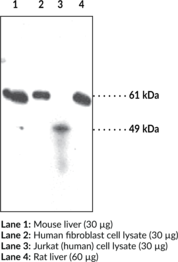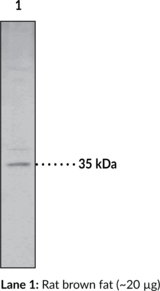Description
Nav1.7 is a voltage-gated sodium channel encoded by the SCN9A gene that is expressed in sensory and dorsal root ganglia neurons as well as in the superficial laminae of the spinal cord.{41708} Nav1.7 amplifies small depolarizations of the membrane and is involved in pain perception. Inactivating gene mutations for Nav1.7 are responsible for congenital insensitivity to pain, a disorder characterized by a complete lack of pain perception. Activating gene mutations for Nav1.7 are responsible for various pain-related disorders. Mutations that decrease the action potential threshold by shifting the voltage dependence and slowing deactivation lead to hyperexcitability of dorsal root ganglia neurons in inherited erythromelalgia, which is characterized by redness and burning sensations in the feet.{41709} Missense mutations that reduce fast inactivation of Nav1.7 channels lead to persistent sodium current and are associated with paroxysmal pain disorder, which affects the sacral region and face.{41710} Cayman’s Nav1.7 Monoclonal Antibody (Clone S68-6) can be used for Western blot, immunoprecipitation, and immunocytochemistry applications.
Synonyms:
Immunogen: fusion protein amino acids 1,751-1,946 of rat Nav1.7
Formulation: 100 µg of protein G-purified IgG in 100 µl PBS, pH 7.4, containing 50% glycerol and 0.09% sodium azide
Isotype: IgG1
Applications: WB, IP, and ICC
Origin: Animal/Mouse
Stability: 365 days
Application|Immunocytochemistry||Application|Immunoprecipitation||Application|Western Blot||Product Type|Antibodies|Monoclonal Antibodies||Research Area|Neuroscience|Pain Research



